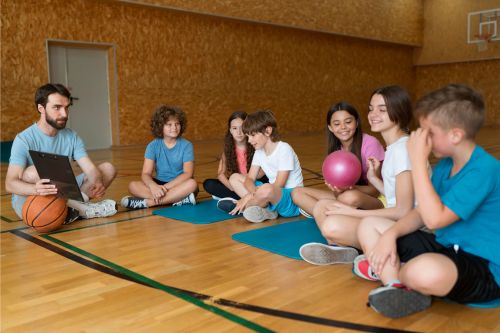Table of Contents
The importance of extracurricular activities in education
The journey through education is not solely about textbooks, lectures, and exams. While academic achievement is undoubtedly a crucial aspect of a student’s life, it’s equally essential to strike a balance by incorporating extracurricular activities into your daily routine. Often seen as ‘fun’ pursuits outside the classroom, these activities play a pivotal role in personal growth, skill development, and overall well-being. In this blog, we’ll discuss the significance of extracurricular activities in maintaining a healthy balance between academics and fun.
The role of academics
The core of any educational system is the role of academics. They provide students with essential knowledge, skills, and qualifications for future careers. Pursuing academic excellence is undoubtedly commendable, and it’s a primary reason why students attend school, college, and university. However, a well-rounded education involves more than just classroom instruction and examinations.
The allure of extracurricular activities
Such activities encompass a wide range of pursuits outside the regular academic curriculum. These activities include school-sponsored clubs, sports, arts, community service, or hobbies. Here’s why they are so important-
1. Skill development
Extracurricular activities offer a platform for developing skills that go beyond the classroom. For instance, joining a sports team enhances teamwork and leadership abilities. Participation in a debate club hones public speaking and critical thinking skills.
2. Balanced growth
While academics focus on cognitive, social, and ethical development. It also provides cultural and global awareness. Extracurriculars address other crucial facets of growth, including physical fitness, creativity, and emotional intelligence. Striking a balance between academics and extracurriculars ensures holistic development.
3. Stress reduction
Academic pressures can be overwhelming. Extracurricular activities provide an excellent outlet for stress relief. Engaging in something you’re passionate about can rejuvenate your mind and boost your overall well-being.
4. Time management
Balancing academics with extracurriculars teaches valuable time management skills. Students learn to prioritize tasks, meet deadlines, and make the most of their day.
5. Networking
Extracurricular activities often involve interacting with peers who share similar interests. This provides opportunities for networking, building friendships, and developing a support system that extends beyond academics.
Academic excellence and extracurriculars

Contrary to the belief that extracurricular activities detract from academic performance, numerous studies demonstrate a positive correlation between involvement in extracurriculars and academic achievement. Here’s why the two complement each other-
1. Enhanced focus
Participating in extracurriculars can improve concentration and focus. Knowing a student might have limited time for study encourages efficient learning.
2. Enhanced Communication Skills
Extracurriculars, especially those involving public speaking, debate, or writing for school publications, can significantly improve a student’s communication skills. These skills are beneficial in-class presentations, essays, and discussions.
3. Broadened Horizons and Interests
Participation in extracurriculars exposes students to a wide range of interests and subjects they may not encounter in their regular coursework. This can spark curiosity and a love for learning beyond what’s required in the classroom.
4. Motivation and goal setting
Having personal interests and goals outside academics can motivate to excel academically. When students are enthusiastic about their extracurricular activities, they tend to set higher standards for themselves.
Exploring various extracurricular options

The world of extracurricular activities is vast and diverse, allowing students to find something that resonates with their interests and talents. Here are some common categories-
1. Sports and physical activities
Participating in sports not only promotes physical fitness but also instills discipline, teamwork, and perseverance. Whether it’s basketball, soccer, or swimming, sports offer many benefits.
2. Arts and creativity
Activities such as painting, music, drama, and writing provide a creative outlet. They nurture self-expression, innovation, and artistic skills.
3. Academic clubs
Joining academic clubs such as debate, math, or science teams allows students to pursue their academic interests and challenge themselves intellectually. These clubs deepen knowledge of the subject and help you engage with faculty.
4. Community service
Engaging in volunteer work or community service instills empathy and a sense of social responsibility. It’s an opportunity to make a positive impact on society.
5. Hobbies and personal interests
From gardening to photography, pursuing personal hobbies can be both relaxing and fulfilling. Such hobbies often turn into lifelong passions.
Achieving the balance
Balancing academics and extracurricular activities may seem daunting, but it’s entirely achievable with effective time management and a few key strategies. They are-
1. Prioritize your time
Identify your academic and extracurricular commitments and prioritize them based on deadlines and importance.
2. Set realistic goals
Establish achievable academic and extracurricular goals. This ensures you’re not overwhelmed with unrealistic expectations.
3. Create a schedule
Maintain a well-organized schedule that includes dedicated study time, extracurricular activities, and leisure. Stick to your schedule.
4. Learn to say no
While it’s essential to explore various interests, avoid over-committing yourself. Be selective about the activities you choose to pursue.
5. Seek support
If you’re struggling to manage your academic and extracurricular responsibilities, don’t hesitate to seek support from teachers, mentors, or counselors..
Key takeaways
- Striking a balance between academics and extracurricular activities is essential for a well-rounded education and personal growth.
- Extracurricular activities provide opportunities to develop skills such as teamwork, leadership, public speaking, and critical thinking that extend beyond the classroom.
- While academics focus on cognitive growth, extracurriculars contribute to physical fitness, creativity, and emotional intelligence, promoting holistic development.
- Balancing commitments requires prioritization, setting realistic goals, maintaining a well-organized schedule, being selective about activities, and seeking support when needed.
We hope you found this blog insightful. Your thoughts and feedback are valuable to us. Please feel free to share your comments and insights in the section below. If you have any further questions or would like to explore this topic in more detail, don’t hesitate to reach out to us. We’re here to assist you with any queries you may have.
Liked this blog? Read next: Robotics courses at Aalborg University, Denmark | Your handy guide
FAQs
Q1. What are extracurricular skills?
Ans- Extracurricular skills, also known as soft skills or transferable skills, are abilities and attributes that individuals develop through their participation in extracurricular activities outside of formal education or employment settings.
Q2. How do you explain extracurricular activities in an interview?
Ans- You can start explaining by determining the activities you are involved in and then highlight the skill sets you learned. Explain to the interviewer how your extracurricular hobbies helped you thrive at work and contribute to the organization’s success. You can combine your responses with a real-life incident to corroborate better.
Q3. What are good extracurricular activities to put on an entry-level candidate’s resume?
Ans- Sports, Student leadership, Arts, Volunteering, Mentorship, and Professional societies are some of the good extracurricular activities to add to your resume.






